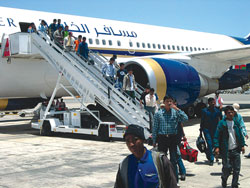 Last week we heard a lot about the agitating Nepali workers facing jail sentences and deportation in Doha. In Malaysia, Nepali migrant workers are occasionally in the news, for the wrong reasons. In India, courtesy the media, Nepali domestic help are seen as a thieving lot. The image of the Nepali worker overseas has taken quite a beating.
Last week we heard a lot about the agitating Nepali workers facing jail sentences and deportation in Doha. In Malaysia, Nepali migrant workers are occasionally in the news, for the wrong reasons. In India, courtesy the media, Nepali domestic help are seen as a thieving lot. The image of the Nepali worker overseas has taken quite a beating.
Some argue that such incidents will naturally happen more often as a simple factor of increasing numbers of Nepali workers overseas. But the Beed doesn't buy that throw-your-hands-up ke garne attitude. We need to take a hard look at our global pan-Nepali identity.
This has little to do with the new million dollar industry devoted to examining Modalities of Nepali Identity, but it still has to do with money all right. We've often established in this column that service sector jobs are only going to become more, not less important for individual Nepalis' careers and for economic growth in general. Given that, it matters very much how our workers abroad behave.
Since 1996 when the current labour laws were promulgated, political leaders have used, abused, and misused the workforce for their own objectives. We all know the harm done by opportunistically radicalised pseudo-militant labour forces.
Workforces now try to out-extreme each other. Their actions range from closing down factories, locking away managers, creating security hazards at the workplace, and straight out assaulting business owners. The objective is to destroy as much as possible of the institution that has given people employment.
The Doing Business Report dutifully spells out, year after year, how Nepal's labour laws and labour force are the biggest competitive disadvantages. We're so happy to just be in the report, we don't take on board the reasons for our inclusion-dismal business conditions. Then there's the other paradox we have to contend with-our trade unions are often donor funded, and that is the support which makes their efforts to spread inefficiency all the more, well, efficient. Factory owners might be scared to ride around in SUVs, but union bosses are happy to flaunt theirs.
It takes a long time to build a brand especially when the image in question is that of a country, and just a little to destroy it. We're midway through a peace process, but still seen as a strife-torn country. On the other hand, there are also a lot of positive perceptions that we can leverage. Generations of enrolment in the British Army mean our reputation as good security personnel for global jobs is unsurpassed. Our legendary loyalty, hospitality, and caring nature makes us good domestic workers. The politeness of Nepali waiters and hotel staff and their willingness to go the extra mile for customers means you find many of us in the hospitality industry around the world. We need to work to keep these sides of our identity bright and visible. Stories of militancy, whether political or union, will do nothing for the tens of thousands of Nepalis who work overseas and keep this country afloat with their remittances.
We need a Young Constructive League to get our place in the world back on track.



